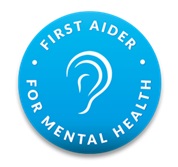Mental Health First Aid
Mental Health First Aid
The World Health Organisation defines health as “a state of complete physical, mental and social well-being and not merely the absence of disease or infirmity”. Mental health is a state of mental well-being that enables people to cope with the stresses of life, realize their abilities, learn well and work well, and contribute to their community. It is an integral component of health and well-being that underpins our individual and collective abilities to make decisions, build relationships and shape the world we live in. Mental health is a basic human right. And it is crucial to personal, community and socio-economic development.
Mental Health First Aid
The Mental Health First Aid (MHFA) course goes into detail on a wide range of mental health conditions and the support and help that can be provided. It incorporates the First Aid for Mental Health Action Plan and covers ways in which a positive mental health culture can be supported within a workplace. It allows delegates to gain knowledge on how to identify, understand and help someone who may be experiencing a mental health issue. It will teach them to listen, reassure and respond, even in a crisis, and potentially stop a crisis from happening.
Mental Health First Aider
 In general, the role of a Mental Health First Aider (MHFAider) in the workplace is to be a point of contact for an employee who is experiencing a mental health issue or emotional distress. This interaction could range from having an initial conversation through to supporting the person to get appropriate help. As well as in a crisis, Mental Health First Aiders are valuable in providing early intervention assistance for someone who may be developing a mental health issue.
In general, the role of a Mental Health First Aider (MHFAider) in the workplace is to be a point of contact for an employee who is experiencing a mental health issue or emotional distress. This interaction could range from having an initial conversation through to supporting the person to get appropriate help. As well as in a crisis, Mental Health First Aiders are valuable in providing early intervention assistance for someone who may be developing a mental health issue.
MHFAiders have received training to spot signs and symptoms of poor mental health and to respond accordingly. They have been trained to listen and communicate in a non-judgmental and inclusive way and can support you in seeking additional support. MHFAiders can help to signpost towards recognised supports (both professional and others) however, the support you seek following the conversation will ultimately be your decision.
Reasons you may contact an MHFAider include:
- You have concerns about a colleague or student’s mental wellbeing (usually shown by a change of behaviour).
- You yourself are experiencing mental health difficulties e.g. feeling stressed, anxious, low and want to share this with someone and/or explore options for seeking help (you do not need to have been diagnosed with a mental health condition).
- You see a colleague or student in emotional distress and are not sure how to handle the situation or would like some support in handling the situation.
- You need advice about supporting someone you know who has a mental health condition or is experiencing mental health difficulties.
- You want some information and guidance on staff and/or student support services within the University.
- Or you just simply need to chat to someone who will listen.
Mental health support resources at Queen Mary
- For staff - Human Resources wellbeing webpages.
- For students - Student wellbeing hub.
External resources
- NHS Health & Wellbeing Programmes
- Mind
- Samaritans – or call 116 123 (24 hours, 365 days a year)
- Togetherall -
- Working Minds - Work Right to keep Britain safe
- Stress and mental health at work - HSE
Further information:
- Mental Health First Aider – Duties and Responsibilities [DOC 55KB]
- The Stress Container Activity [DOC 71KB]
- Look after yourself - traumatic event [DOC 56KB]
- A guide for staff, supporting students in urgent situations
Queen Mary Policy and procedures
Primary Legislation:
The Health and Safety (First Aid) Regulations 1981
For advice and assistance at Queen Mary:
contact the H&S Manager / Advisor for your Faculty / PS or the subject lead.
All HSD staff can be contacted via the HSD Helpdesk.